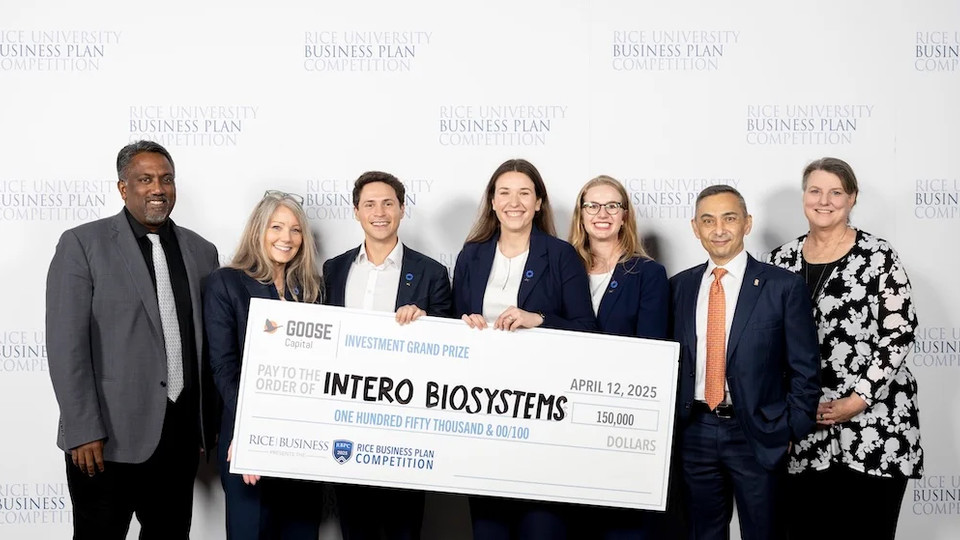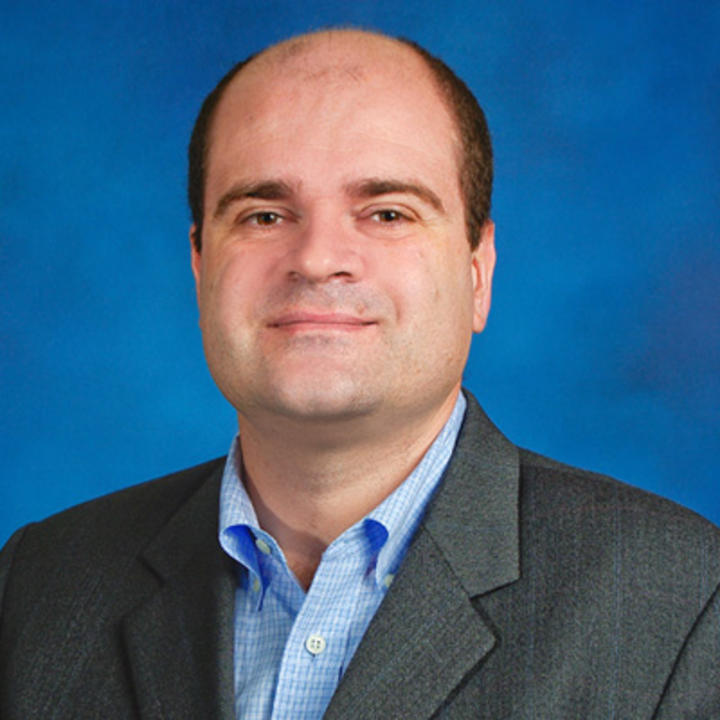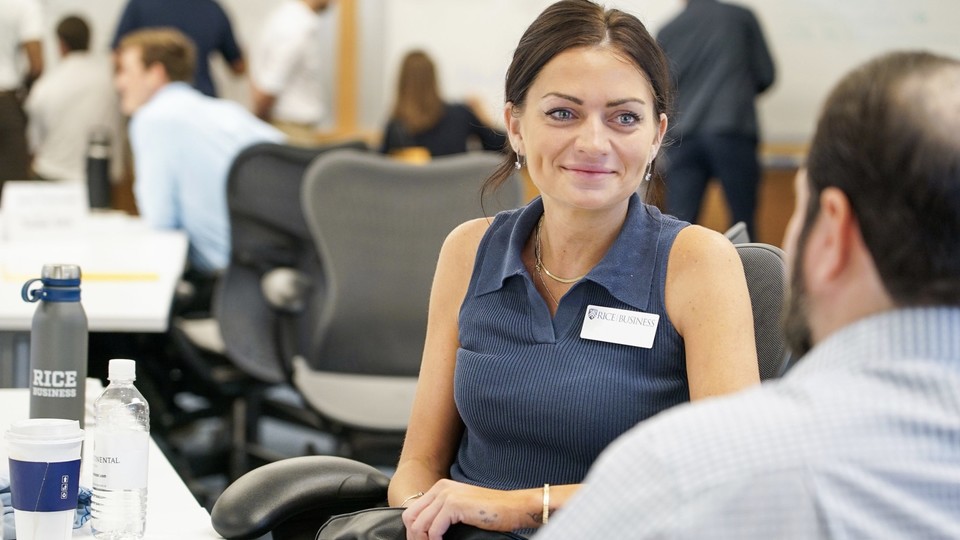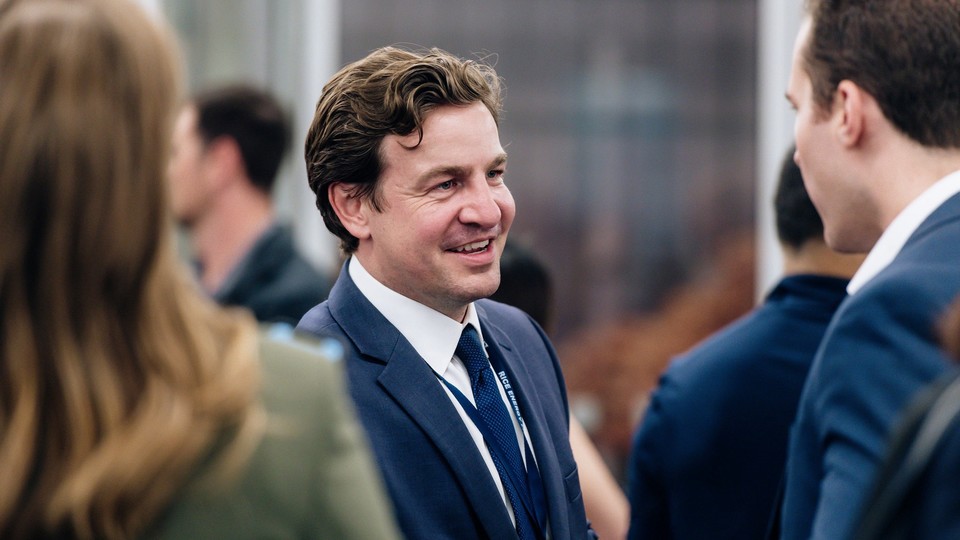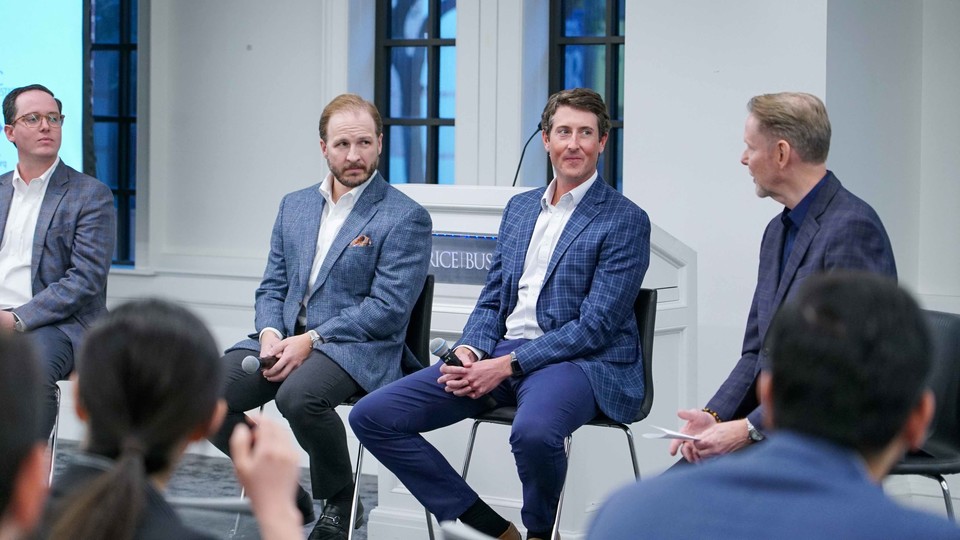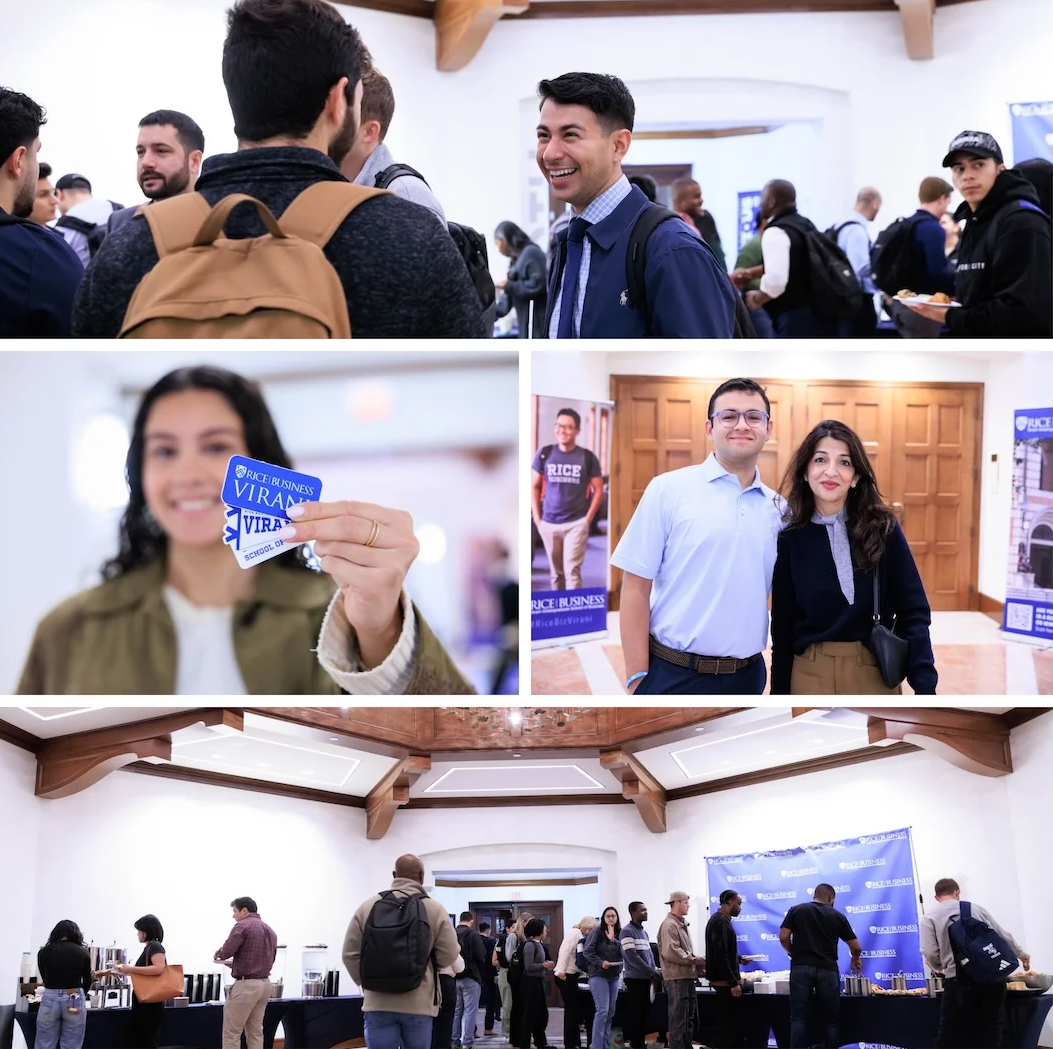
Virani Undergraduate School of Business provides opportunities for future leaders
The Virani Undergraduate School of Business at Rice University celebrated its one-year anniversary on October 29, with coffee and breakfast for its students as they made their way to class.
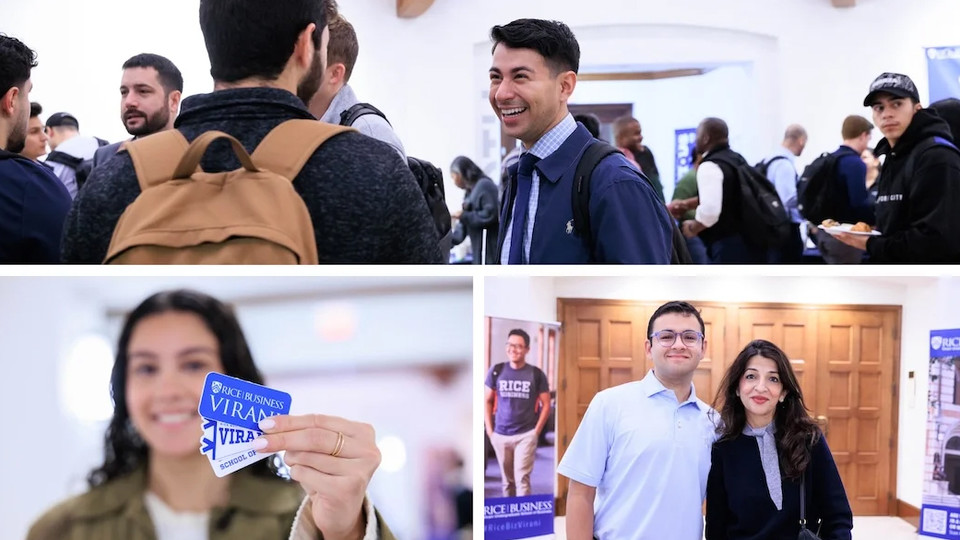
The Virani Undergraduate School of Business at Rice University celebrated its one-year anniversary on October 29, with coffee and breakfast for its students as they made their way to class. The undergraduate program is named after Houston business and community leaders Farid and Asha Virani ’89 thanks to their historic gift in 2024.
“This gift empowers our undergraduates to move beyond theory and step boldly into the real world,” said Bob Dittmar, the Houston Endowment Professor of Finance and associate dean of the Virani Undergraduate School of Business. “It opens doors to internships, research and experiences that shape confident, capable leaders — not someday but right now. We are deeply grateful for the Viranis’ investment in our students’ potential and in the future they will help build.”

More than 360 undergraduate students are currently declared as business majors at Rice and more than 1,200 are enrolled in business courses. Rice Business leadership is supporting ongoing growth in the number of business majors by advancing opportunities in areas like energy transition, artificial intelligence, nonprofits benefiting society at large, health care reform and the revitalization of urban communities. Those opportunities are already taking shape for the Class of 2024 with 92% of Rice undergraduate business majors finding their postgraduate paths within six months of graduation.
The business major was designed to enable the next generation of business leaders with a well-rounded and in-depth foundation in business fundamentals. The employers of the 2024 undergraduate business graduates include AT&T, the Houston Rockets, GE HealthCare, Capital One and more.
Virani students learn from the same top-notch faculty who teach the Jones Graduate School of Business MBA programs. The tight-knit community means that professors are open to work one-on-one with various research projects, and students can learn from each other as they tackle internships and externships.
In 2024, the Viranis made a generous philanthropic gift to the business program, igniting a new era of opportunity for students. This gift supports undergraduate curriculum development and delivery, cocurricular opportunities and other resources to support undergraduate career readiness and academic success.
“The Virani Undergraduate School of Business prepares students with rigorous scholarship, real-world immersion and leadership readiness opportunities,” Rice Business Dean Peter Rodriguez said. “We are charting an extraordinary future, not just for the school but for the future leaders who study here.”
Rice Business’ new 112,000-square-foot building is set to open in 2026 with additional event space and features new, larger classrooms primarily to support the growth of the Virani Undergraduate School of Business as enrollment continues to grow year over year.
You May Also Like

“As a result, Fortune’s methodology doesn’t account for the true price tag of an MBA education. That’s particularly noticeable at generous programs like Rice University’s Jones Graduate School, where 95% of students receive support…with the average annual award being $40,000 per year according to the school.”
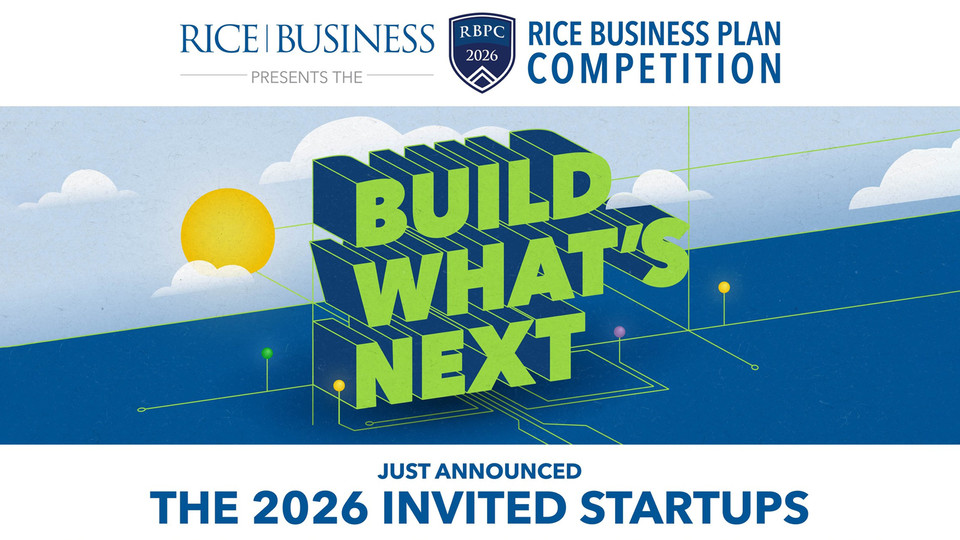
The 2026 Rice Business Plan Competition announced today the 42 startups invited to compete for more than $1 million in prizes April 9-11 at Rice University and in the Ion District. The RBPC, presented by Rice Business and hosted by the Rice Alliance for Technology and Entrepreneurship, serves as a global stage for emerging ventures from leading universities.
World’s largest, richest intercollegiate student startup competition opens call for graduate founders to compete for $1M-plus in prizes
Now in its 26th year, the Rice Business Plan Competition (RBPC) presented by Rice Business has officially opened applications and is calling on the next generation of world-changing graduate student founders to compete on the global stage. This is where tomorrow’s industry leaders get their start.
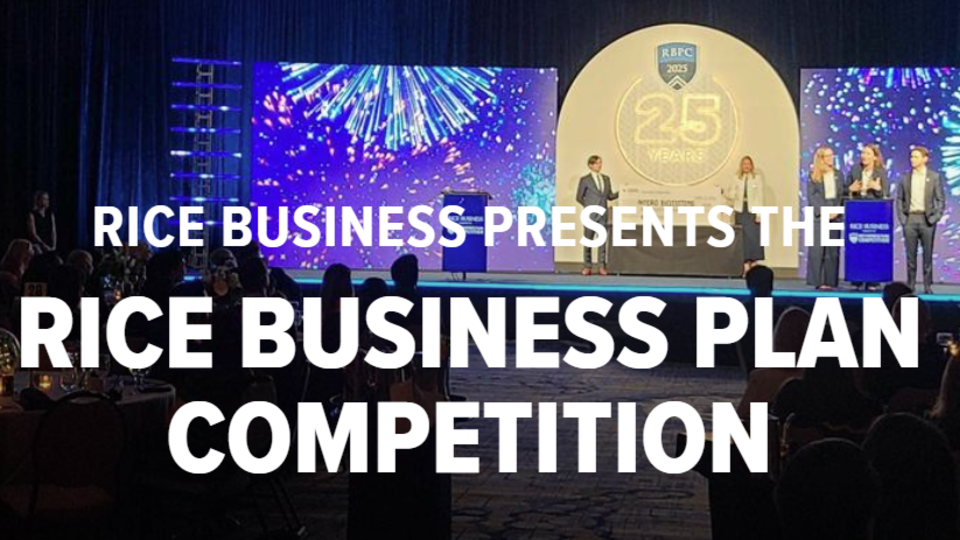
Now in its 26th year, the Rice Business Plan Competition (RBPC) presented by Rice Business has officially opened applications and is calling on the next generation of world-changing graduate student founders to compete on the global stage. This is where tomorrow’s industry leaders get their start.

Hosted and organized by the Rice Alliance for Technology and Entrepreneurship, the RBPC is widely regarded as the world’s largest and richest intercollegiate graduate student startup competition. Over the course of three days, teams pitch to investors, receive mentorship and compete for more than $1 million in prizes. Since its inception, RBPC alumni have raised more than $6 billion in funding, transforming ideas presented early at Rice into thriving ventures making global impact.
Application deadline: Jan. 31, 2026
Competition dates: April 9-11, 2026 | Rice University, Houston
Rice Business — home to the nation’s No. 1 graduate entrepreneurship program for six consecutive years — is a cornerstone of Houston’s rapidly evolving innovation ecosystem. As the global headquarters for the energy and industrial economy, Houston provides a backdrop for the RBPC, where capital, talent and technology converge.
Each spring, the RBPC draws the brightest entrepreneurial talent from universities worldwide to Rice’s innovation hub and to campus in the heart of Houston. Here, collaboration, investment and cross-university connections strengthen both Rice’s leadership in entrepreneurship education and Houston’s growing role as a global innovation city.
Graduate student-led startups from any university are encouraged to apply by Jan. 31, 2026, at rbpc.rice.edu.
To help prospective teams prepare their strongest applications, the Rice Alliance will host virtual information sessions Nov. 13 and Dec. 11. These sessions will offer insights into the application process, eligibility requirements and what to expect during competition weekend.
Teams are initially eligible for the 2026 RBPC if their startup:
- Includes at least two current students with at least one graduate student in any field of study.
- Is fundraising or seeking investment within the next 12 months.
- Is developing a startup in one of the following sectors: energy; clean tech and sustainability; life science and health care solutions; hard tech; digital enterprise; consumer products and services.
For more than 25 years, the RBPC has been the launchpad for founders at the beginning of their journey. The competition does more than award funding — it helps founders accelerate traction, gain visibility, refine strategy and build relationships with investors and corporate leaders who can open real pathways to scale. Graduate student-led teams who are building enduring companies, redefining industries and developing bold solutions to the world’s biggest challenges are encouraged to apply.
You May Also Like

“As a result, Fortune’s methodology doesn’t account for the true price tag of an MBA education. That’s particularly noticeable at generous programs like Rice University’s Jones Graduate School, where 95% of students receive support…with the average annual award being $40,000 per year according to the school.”

The 2026 Rice Business Plan Competition announced today the 42 startups invited to compete for more than $1 million in prizes April 9-11 at Rice University and in the Ion District. The RBPC, presented by Rice Business and hosted by the Rice Alliance for Technology and Entrepreneurship, serves as a global stage for emerging ventures from leading universities.
When Research Promises the Impossible, Investors Pay the Price
A new study finds that “look-ahead bias” makes trading strategies appear highly profitable in published research, even though they fail in the real world.


Based on research by Jefferson Duarte (Rice Business), Christopher S. Jones (University of Southern California), Mehdi Khorram (Iowa State), Haitao Mo (University of Kansas), Junbo L. Wang (Louisiana State)
Key takeaways:
- Many “can’t miss” option-based trading strategies examined in academic research look impressive on paper because they rely on future data — something no real investor can actually use.
- Once the time-traveling data is removed, those sky-high returns shrink and the risks start to show.
- The pressure to publish big results may help explain why those mistakes were made in the first place.
If something seems “too good to be true,” it probably is — and this old axiom is amplified when money is on the line.
According to new research by Jefferson Duarte, the Gerald D. Hines Associate Professor of Real Estate Finance at Rice Business, investors should be skeptical of investment strategies that promise big returns with little risk — even when they’re published in academic journals.
We all know the sordid tale of Bernie Madoff. The former New York City asset manager lured investors returns that appeared to far outpace the market. For years, he attracted a steady stream of clients with a seemingly flawless performance record. In reality, investor withdrawals were paid using money from new deposits. When the 2008 financial crisis shook markets, Madoff’s $65 billion Ponzi scheme collapsed. Investors rushed to withdraw funds, but there wasn’t enough cash to go around.
Unfortunately, unrealistic performance claims aren’t limited to bad actors like Madoff. Even some peer-reviewed finance papers describe strategies with returns that appear implausibly high.
For an article forthcoming in The Review of Financial Studies, Duarte and his co-authors dug into the details of several influential empirical options papers. And when they tried to replicate their results, they couldn’t. The authorship team found that the option-trading strategies proposed in these papers exhibited “look-ahead bias” — a statistical error that arises when researchers use information that would not have been available when the trading decisions were actually made.
“When we eliminated the intraday data from the analysis, the returns were much smaller, and the level of risk also increased. These were not extremely good deals anymore.”
In layman’s terms, the options trading papers used future data — for example, the average price of a stock or option over the course of a day — to make trading decisions that were supposed to happen at the start of that same day. That’s a problem because, in real life, traders don’t know what the average price will be until the day is over.
So, the authors of these influential empirical options papers were effectively “looking ahead,” using information from the future to make their predictions. This made the results appear far stronger than they would be in reality — essentially giving the strategies an unfair, time-traveling advantage.
One influential study published several years ago claimed that a simple options-based approach could generate astonishing daily mean returns of more than 3%. The strategy involved buying and selling call options — contracts that give investors the right to purchase a stock at a specified price.
To decide which call options to trade, the researchers used filters based on liquidity — how easily a contract can be bought or sold without affecting its price. But their method relied on each contract’s average price over the entire trading day to make selections at the start of that same day — using information that wouldn’t actually be known until after markets closed. When Duarte and his co-authors replicated the strategy using only information available at the start of the trading day, the returns proved far more modest.
“Just imagine profiting a few percentage points per day,” says Duarte. “If you could do that every day for years, you would have a money wealth machine. But in practice, you would need a crystal ball to do this. When we eliminated the intraday data from the analysis, the returns were much smaller, and the level of risk also increased. These were not extremely good deals anymore.”
But why was a paper with such a significant error published in the first place? Publication bias within academia could have contributed. Academic journals favor research that has very strong results, and this can nudge authors to find ways to make their results look stronger than they actually are.
Simply put, if a proposed options-trading strategy did not generate exceptionally high returns, it might never have been published. But a strategy showing smooth gains averaging more than 3% per day is bound to attact attention — even if it isn’t actually feasible.
Duarte’s research examined only three options papers, and he believes there may be more cases of look-ahead bias in the empirical options literature. One concrete way researchers can improve on this is to provide a clear, detailed description of their methods so others can replicate the results.
To reproduce the findings in one study, Duarte and his co-authors had to test 190 different procedures just to figure out how the sample had been selected. If published papers were easier to replicate, he says, it would be far simpler to detect look-ahead biases in the first place.
Duarte also argues that researchers should exercise restraint when selecting their sample. While the use of filters is common in options research and can help remove data errors, they also create opportunities for mistakes — such as look-ahead bias — to slip in.
And if any options strategy appears to outperform the market by a wide margin, it should invite additional scrutiny. Exceptional risk-adjusted returns may signal that an error in the empirical analysis has gone unnoticed.
“When you talk to practitioners — people that actually implement these option strategies,” Duarte says, “they will tell you that these high risk-adjusted returns simply can’t happen on a consistent basis. When they try to replicate a strategy like this, they can’t do it either.”
Written by Ty Burke
Duarte, et al (2025). “Too Good to Be True: Look-ahead Bias in Empirical Options Research,” forthcoming in The Review of Financial Studies.
Director of Real Estate Initiatives
Never Miss A Story
You May Also Like
Keep Exploring
20 Business Schools for High-Paying Finance, Accounting Jobs
U.S. News ranks Rice Business among the top 20 MBA programs for high-paying finance and accounting careers, with 2024 graduates earning an average salary of $155,407.
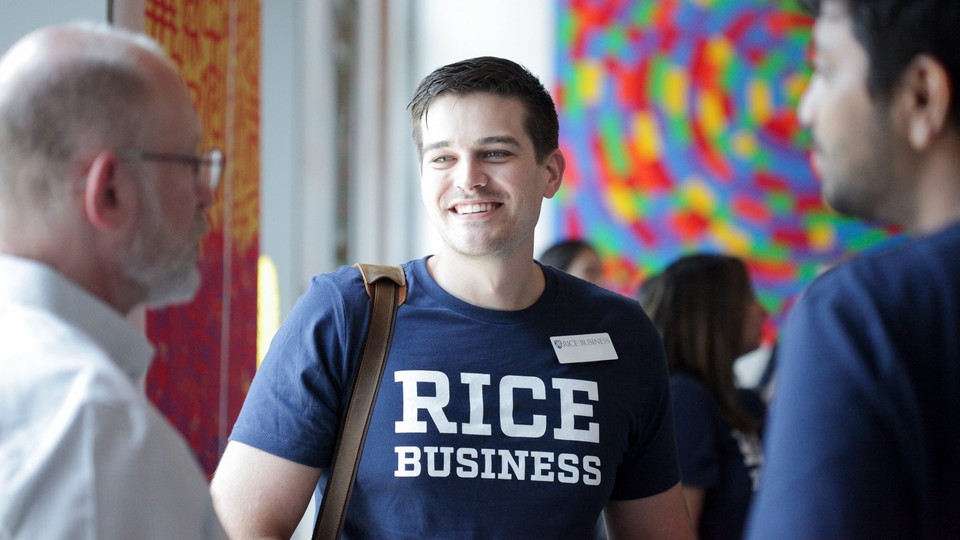
How To Build a Lasting MBA Network
Want to make the most of your MBA experience and make connections that will last? Here’s how to turn everyday interactions into a powerful professional network.
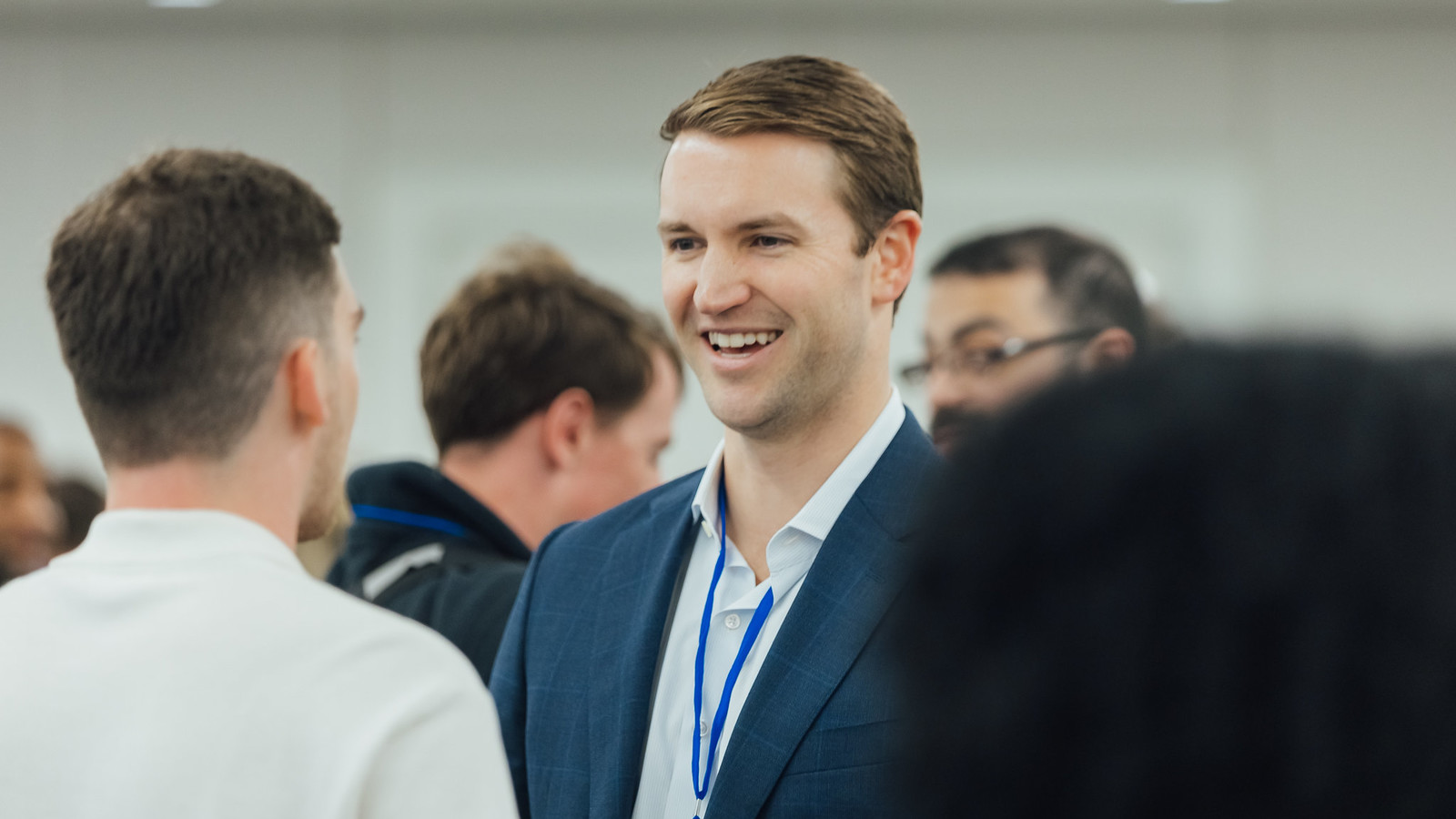
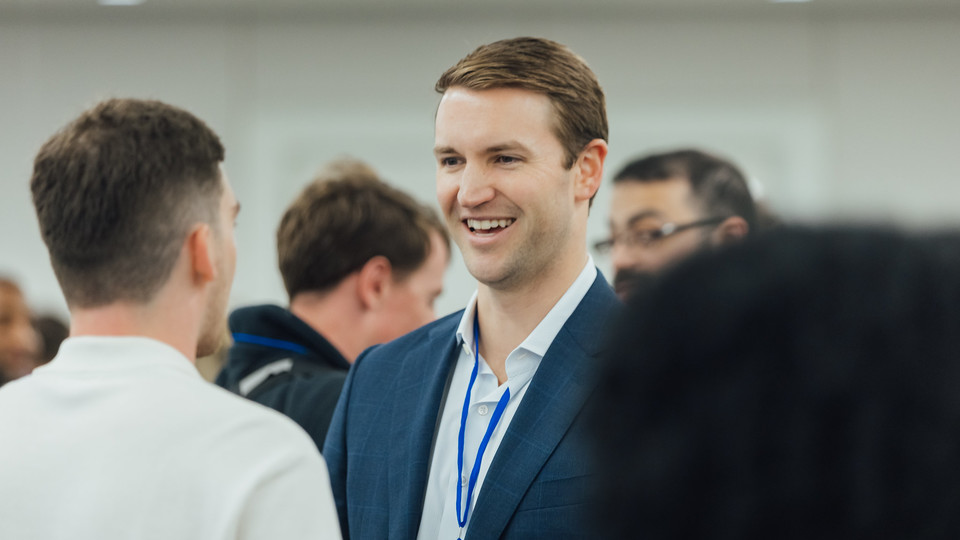
If you spend enough time on campus, you start to realize business school isn’t a place so much as a network in motion. It moves through classrooms, coffee chats and long nights of group work. The peers sitting next to you in class, the alumni a few years ahead of you and the professionals you meet through events and internships — all of these people and moments form the network that will shape your career long after graduation.
Networking has a reputation for being transactional, but it’s really about curiosity — about paying attention to people and what they care about. The good news is, you can practice that every day.
Here are some tips to keep in mind.
1. Lead With Presence
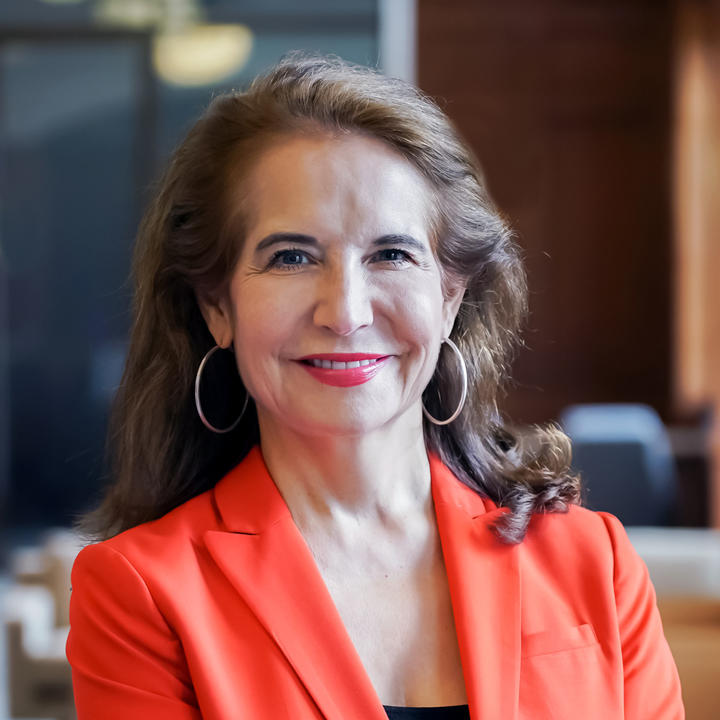
Janet Moore, senior lecturer and director of the Rice Business communication program, says that effective networking begins with how you show up. Preparation, attention and respect all communicate confidence.
“Confidence, not arrogance, is a key element of executive presence. Effective networkers exude executive presence while also communicating interest in others,” she says. “People remember how you make them feel — so focus on listening as much as you speak.”
That means preparing before events, asking thoughtful questions and showing genuine interest in others’ experiences. Presence also includes nonverbal cues — eye contact, posture, dress — that signal confidence and approachability.
2. Be Curious
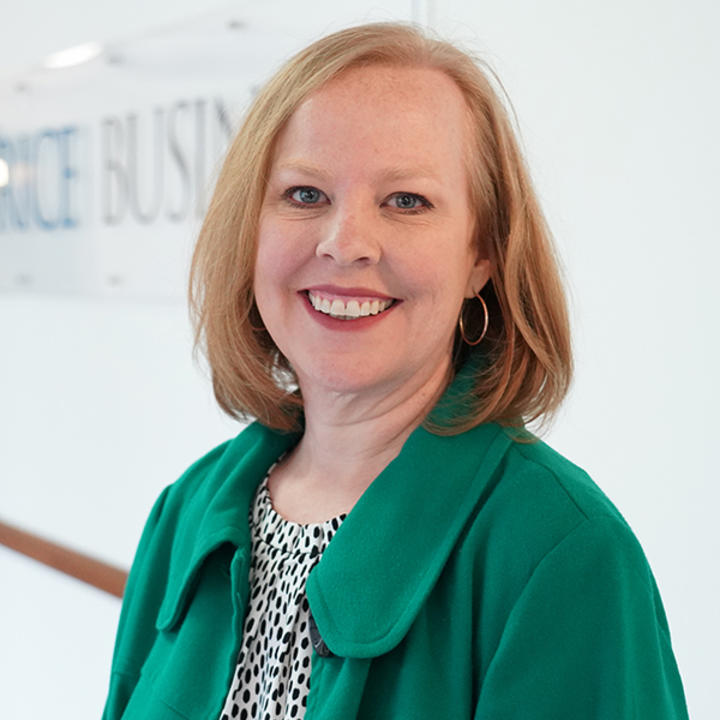
Jessica Campbell, executive director of the Career Development Office at Rice Business, encourages MBA students to think of networking as exploration, not extraction.
“People can tell when you’re reaching out for a transaction instead of a connection,” says Campbell. “Start by learning someone’s story and finding common ground. Trust grows when you lead with curiosity, not a request.”
Instead of asking, “Can you help me get a job?” Campbell suggests asking questions like “What do you enjoy most about your role?” or “What skills helped you succeed in your industry?” Curiosity opens doors that self-interest can close.
Interested in Rice Business?
3. Diversify Your Connections
It’s easy to gravitate toward classmates or colleagues who share your background, interests or career goals. But your most valuable connections often come from unexpected places.
Join a club outside your comfort zone, attend a conference in a different field or volunteer for a cross-functional project. These experiences expand not only your network but also your perspective.
4. Follow Up — and Stay in Touch
The real work of networking happens after the first meeting. Send a short thank-you email, share an article related to a conversation you had, or simply check in periodically. Relationships deepen over time through small, consistent gestures of interest and respect.
“The conversation shouldn’t end when you walk out of the room,” Moore says. “A thoughtful follow-up shows that you valued the interaction — and gives you a chance to start building a relationship.”
5. Remember: Networking Is a Long Game
Your network doesn’t end when you graduate — it evolves with you. Stay curious, keep showing up, and you’ll find that the best connections are the ones that grow alongside your career.
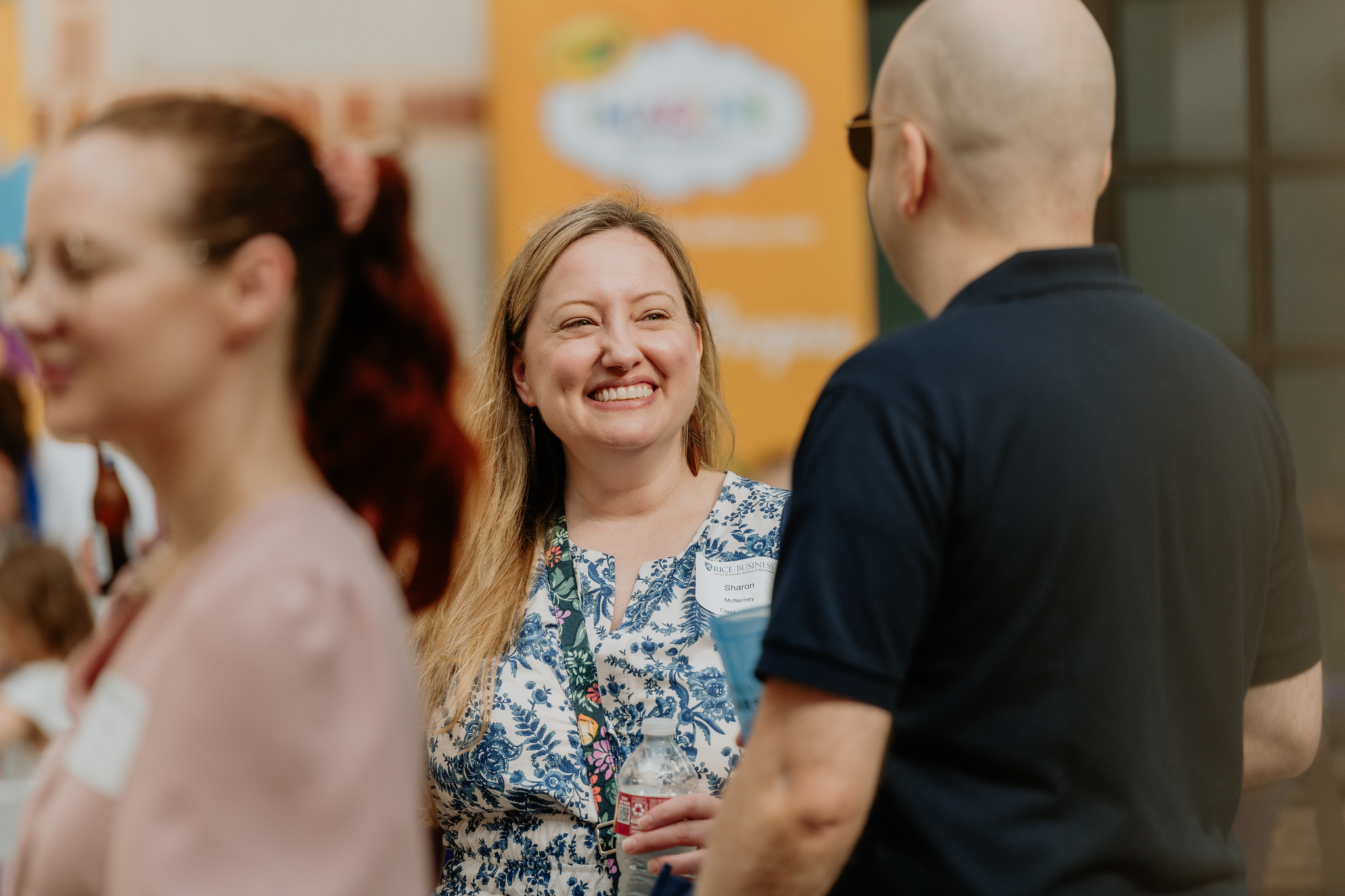
As Campbell notes, “The connections you make now may pay off years later. Listen, show respect, and invest in relationships over time, and you’ll build social capital that will carry you through every stage of your career.”
The MBA experience is one of the few times in your career when you’re surrounded by hundreds of ambitious, curious people who want to help each other grow. Show up with confidence, stay curious and play the long game — and you’ll leave business school with more than a degree. You’ll leave with a network that lasts a lifetime.
You May Also Like
Keep Exploring
8+ can't-miss Houston business and innovation events for November
Rice Business will host the Rice Customer-Based Strategy Symposium on November 18, a recurring forum for sharing innovative ideas on customer-focused strategy and execution. The event features peer-reviewed research from top academics and industry insights from executives.
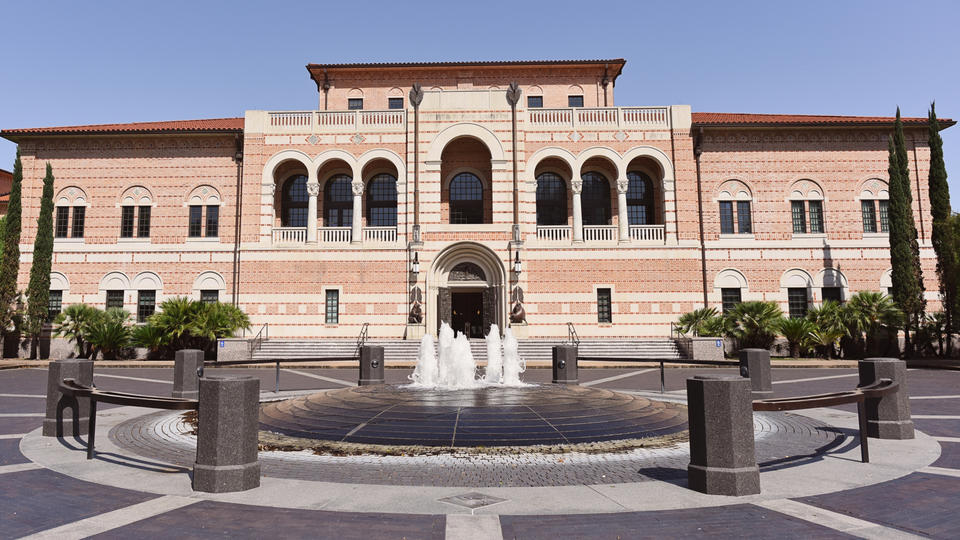
Stay Humble, Hungry and Scrappy feat. Farid Virani
Season 5, Episode 19
Farid Virani shares his entrepreneurial journey, the Virani family’s commitment to education and community, and the vision behind the Virani Undergraduate School of Business.

Owl Have You Know
Season 5, Episode 19
One year ago, the Virani family made a historic gift to Rice Business, establishing the Virani Undergraduate School of Business. To mark the occasion, Owl Have You Know welcomes Farid Virani — entrepreneur, philanthropist and proud Rice University parent.
In 1999, Farid founded Prime Communications with a single storefront in Houston’s Baybrook Mall. Today, Prime Communications is the largest AT&T authorized retailer in North America, with more than 2,500 locations across the U.S., Canada, and Mexico. Along the way, Farid has relied on three guiding principles — "stay humble, hungry and scrappy" — which continue to shape his approach to business and life.
He joins host Maya Pomroy ’22 to share his entrepreneurial journey, the Virani family’s commitment to education and community, and the vision behind the Virani Undergraduate School of Business — a school designed to empower the next generation of ethical, curious, and compassionate business leaders.
Watch
Listen
Subscribe to Owl Have You Know on Apple Podcasts, Spotify, Youtube or wherever you find your favorite podcasts.
Episode Transcript
-
[00:00]Maya Pomroy: Welcome to Owl Have You Know, a podcast from Rice Business. This episode is part of our Flight Path series, where guests share their career journeys and the stories of the Rice connections that got them where they are.
Today, our guest is the entrepreneur behind one of the most transformative moments in Rice Business school's history. Farid Virani, together with his wife, Dr. Asha Virani, Rice Class of 1989, made a historic philanthropic gift that gave our undergraduate program a name, the Virani Undergraduate School of Business. It's much more than a name. It's an investment and opportunity, a catalyst for innovation, and a commitment in developing leaders to solve the world's toughest challenges. The impact is immediate and profound.
Entrepreneur, philanthropist, builder of businesses, teams, and pathways for the next generation. Farid joins us now to talk about his journey as an entrepreneur, scaling with purpose, his deep commitment to philanthropy, and why investing in students is the smartest bet of all.
Farid, thank you so much for joining us on the podcast today.
[01:18]Farid Virani: Thank you. Thank you for having me.
[01:20]Maya Pomroy: Everything about you and your family has such a deep purpose. And we are sitting here in The Faris Foundation that you and Asha founded in loving memory and in honor of your son, Faris. You have been deeply ingrained in so many philanthropic causes throughout the city of Houston. You know, reading your profile, it really is, you know, phenomenal to think about how much you have given back to our city and, really, our country and to our world. And this continues to progress, even with the gift that you gave to Rice Business.
So, when you came to the United States at the age of 19 and then eventually landed in Houston, what was it about this city that you decided, “This was it. This was the place that I'm going to set down my roots and this is where I'm going to begin the next chapter of my story?”
[02:21]Farid Virani: I don't think that there was any planning on my part. I think it's a little bit of grace, some pixie dust, and a little happy coincidence that I ended up in Houston. And once I came here, like I said, I was 19 and just went through the challenges of settling and going to school and what have you. And the city was welcoming, people were kind and gave me opportunity that allowed me to adopt the city as my hometown. So, that's, kind of, how it all happened. Not to mention, I met my beautiful wife, Asha, here and a beautiful family all happened here. So, it is home.
[03:11]Maya Pomroy: Can you tell me how you and Asha met?
[03:13]Farid Virani: We met in 1988. Around that time at Rice, she was a student. And as some people know, I was a waiter across the street at Marriott Medical Center.
[03:28]Maya Pomroy: So, she came to the hotel?
[03:31]Farid Virani: No, no. It was a social event. It was a New Year's Eve get together, a New Year's Eve party. And I remember going there after doing my closing. So, I went there in my uniform and we, by chance, met.
[03:48]Maya Pomroy: That's beautiful.
[03:49]Farid Virani: That was a long time ago, but yes, that's exactly how it happened.
[03:54]Maya Pomroy: And the rest is, so to speak, history.
[03:56]Farid Virani: Yes. Literally, yes it is. Yeah. 37, 36 years later, yeah.
[04:01]Maya Pomroy: Congratulations!
[04:03]Farid Virani: Thank you.
[04:04]Maya Pomroy: That's definitely a milestone.
[04:06]Farid Virani: It is.
[04:06]Maya Pomroy: So, you came to Houston. And, you know, I want to talk about the intersection of business and philanthropy. And, you know, that runs deep in both you and Asha's veins. And so, you know, that's something that is very unique to your story. So, you came to the U.S. and you started a business, literally one store in Baybrook Mall, right?
[04:36]Farid Virani: Yeah.
[04:36]Maya Pomroy: That you scaled to more than 2,500 locations in North America, Canada, and Mexico. Okay. So, tell me your story, your entrepreneurial journey and your story. How did you do that?
[04:51]Farid Virani: I didn't do it. We did it, meaning it's the team behind the folks that supported me, my family, of course, Asha, and a lot of good luck, good opportunities, some good decisions, and some hard work. So, put it all together and here we are. As far as starting the Baybrook Mall story, the first store, technically….
[05:24]Maya Pomroy: What year was that?
[05:25]Farid Virani: This was 1999. May, 1999. That's, kind of, where Prime Communications started with one store in Baybrook Mall. And over the years, like I said, you know, just good partnerships with businesses, good people, good team players. And together, we were able to just grow the pie, just make the pie bigger and share it with everyone. And that's, kind of, how it all happened.
[05:58]Maya Pomroy: So, you grew this business. And when was it that you decided, “You know what? I feel that it is time for me to start investing in my community. It's time for me to start investing in the city of Houston. It's time for me to start investing in my home and making sure that I can help raise other people to be able to achieve the great heights that I've achieved myself?”
[06:23]Farid Virani: I don't exactly know when it started, but it was always. It's just part of who we are. It’s part of our values, our faith. It's just to give back, give back to the place from where we have gotten so much.
So, I don't precisely know when it all happened, but it just happened over time. Asha has played a very big role in everything I've done because she, more than me, is a kind of force behind our family to do more and leap forward and play forward.
So, it all happened slowly over time, and then momentum built, kind of, as I aged and saw what the needs were and learned more. And then it just slowly built on its own.
[07:17]Maya Pomroy: And so, the needs. So, Houston Rice Business is, you know, a phenomenal educational institution. The best.
[07:27]Farid Virani: Absolutely.
[07:28]Maya Pomroy: The best in Houston. And I know that your son went to Rice Business and graduated in 2021, which is the same year that the undergraduate program began. Was it when he was at Rice that you recognized that there was a need for an undergraduate school at Rice?
[07:46]Farid Virani: So, Faraz, my son, he went to Rice and he graduated literally in 2021.
[07:56]Maya Pomroy: 2021, during COVID.
[07:57]Farid Virani: Exactly. And we had a lot of conversations about what the opportunities were, what were some of the things Rice was doing and not doing, and what were some of the things we should be focused on, especially for the upcoming students, upcoming leaders of our community?
And we were just talking, and a friend of mine brought an opportunity to me that, hey, Rice is looking for somebody to maybe support the undergraduate school, the mission with the building. And that's, kind of, how the conversation started. And once we met Dean Peter Rodriguez, I mean, he is amazing. And meeting him, talking to him, the whole family, got involved and got engaged. And we ended up, kind of, taking a different route, but ended up supporting the school by naming and making a contribution to the undergraduate program.
And it happened. It took almost a year for it to happen, for the conversations to crystallize. But it ended up becoming a family decision that my son, Faraz, played a bigger role. Asha, obviously, they both went to Rice. So, they're very much-
[09:25]Maya Pomroy: Owls.
[09:26]Farid Virani: … Owls. And we have… Like, I have a niece. I have a nephew that went to Rice. Asha has cousins that went to Rice. So, there's a lot of… our family has benefited a lot from Rice and how Rice has played a role in our lives. So, then it was just the stars are aligned on all different sides. And it just all came together with the guidance of Dean Peter. And like I said, it just all came together.
[09:55]Maya Pomroy: Yes. So, now that it's the Virani Undergraduate School of Business, so this will be year…
[10:03]Farid Virani: Two.
[10:04]Maya Pomroy: Year two.
[10:05]Farid Virani: I mean, yeah, upcoming. You know, October 29th is the anniversary.
[10:08]Maya Pomroy: Yes. So, what do you hope that students understand or be inspired by when they're a part of that program?
[10:20]Farid Virani: I mean, first and foremost, they should be thankful and grateful at how fortunate they are to be at Rice, to be at an institution that I believe it's absolutely fantastic to develop them into the future leaders, to give them the education that they're going to get, but more than that, help them become the future leaders, our leaders, leaders that the city, the state, the country needs for us to leap forward into the second half of the century. Because I think education… both my wife, Asha, and I believe education is the absolute number one ingredient that we need in our city and state for us to stay competitive, to stay relevant, and to move forward. And this is, kind of, like, our… we're doing our part to play it forward.
[11:24]Maya Pomroy: So, leadership, you mentioned that quite a bit. So, what's the secret sauce? What are the components of a good leader?
[11:35]Farid Virani: Sure. I absolutely believe a leader has to have humility, has to be humble.
[11:46]Maya Pomroy: Humble, hungry, and scrappy is what you say.
[11:47]Farid Virani: I really believe that. Those are the three things that have had… you know, have been what I would say those are the three things that have, kind of, been principles that have guided me throughout my life and my career, is basically being humble, because when you're humble, you're open to listening to other people. You are open to different ideas. You're open with the fact that someone may know more than you do.
[12:16]Maya Pomroy: There's always going to be somebody that knows more than you do.
[12:18]Farid Virani: And I think, with humility, you are open to listening to that. As far as being hungry, to me, that means you are always curious. You are always wanting to know more. It's just the natural, kind of, curiosity that has served me well. And I believe being hungry, intellectually hungry, it's important. And the last but not the least, as an entrepreneur, being scrappy helps. Doing more with less, using today's tools and technologies to do more with less. And then just outfox the competition by literally being resourceful. That's a mindset. I mean, to me, it's a mindset.
[13:12]Maya Pomroy: Growth mindset. Exactly. It's a growth mindset.
[13:13]Farid Virani: It's an entrepreneurial mindset. It's a scrappy mindset. It's doing more with less mindset.
[13:18]Maya Pomroy: So, what do you believe, specifically with regards to business education in particular, is so essential, you know, in terms of the next generations? What are the challenges that you see? Because there is a race, right?
[13:35]Farid Virani: Yes.
[13:35]Maya Pomroy: There's a race, more so than I think before. What are the qualities that you feel that we really need as a society to, you know, rise above the competition?
[13:46]Farid Virani: I agree. So, what is one thing that I believe has changed systemically throughout the world is speed by which things change. I think, in my lifetime, I've seen things change, but man, now talk about changing fast. Super fast, right? In the world of AI and in a day and all the… so, everything is moving very fast.
So, for the next generation of entrepreneurs, the business leaders, not only have to build businesses and solve problems in society, but they have to be agile, they have to be fast, they have to embrace technology. That's a lot of stuff that is coming their way. They have to find their own North Star as to what they're going to do. And how you do it, I think, will depend on individuals, on their passion, on what they find exciting, what excites them.
But more than that, to me, it will require a mixture of basic business fundamentals, of doing the right things, building things, having great teams around, but embracing technology, not running away from it. Embracing change, not running away from it, I think, will separate successful entrepreneurs and businesses with those who want to take a shortcut.
[15:14]Maya Pomroy: So, you know, specifically for the Virani School, so because we are at the very, very beginnings of the school, what do you hope, looking back 5, 10, 15 years, is going to be, you know, what the Virani School is known for? And, you know, what do you want it to be? What do you want it to be known for?
[15:47]Farid Virani: So, my hope is that the Virani School at Rice becomes a top 10 school in the country.
[15:58]Maya Pomroy: Top five.
[16:00]Farid Virani: Top five. You said it. You said it. But more than that for me is that it becomes an institution, Virani School becomes an institution that develops the future leaders for the country.
Now, whether they are in business, in entrepreneurship, whether it is in the political arena, whether it is in a… in any industry, but so long it develops leaders that give back to the community and give back to the society and give back to the country, then we will all benefit tremendously from, so that is my hope.
[16:40]Maya Pomroy: And, you know, the quality of students at Rice Business, just from my experience going there, you know, I met so many unique people from, really, all over the world that chose Rice specifically because, not only Houston, but Rice Business is a very welcoming place. And so, that's something that I'll forever be grateful for, for my experience at Rice Business.
So, you know, your success clearly goes beyond profit, which I think is what you would like to instill in the Virani School. That it's not so much about profit, but it's also about being a good human being and a good community leader. And that is something that I think is very unique to Rice.
And so, you know, we're sitting here in The Faris Foundation, which is such a meaningful part of your family's work. And for those who may not know about The Faris Foundation, could you talk a little bit about what it is?
[17:47]Farid Virani: Sure. So, before I start, September is Childhood Cancer Awareness Month. That's what this event is about. Most people don't know about that, that September is Childhood Cancer Awareness Month. And we have had a very, what I call… we have suffered a profound loss in our family and our lives. We lost our youngest son to a rare bone cancer. That was a very difficult chapter in our lives and especially for my wife and I. You can't help when things happen, but you certainly can react differently to bounce back, to try to do things.
[18:45]Maya Pomroy: To change the future to better.
[18:46]Farid Virani: To change the future. And also, to… and that's what defines you. It's not the tragedy. So, that's, kind of, where this Faris Foundation, which my wife Asha leads, came together. And the mission for Faris Foundation is to provide brighter days and better treatments for children with cancer.
That's basically what they do. They do that with many different initiatives, several different initiatives, research, awareness. They do fund-raise. And they also do this beautiful arts and music programs and therapies. They also do what we call the JuJu programs, where we send care packages to kids nationwide.
[19:34]Maya Pomroy: I love that JuJu program. I know that there's a room back there that's called the JuJu room.
[19:39]Farid Virani: Yeah. They do that. And it's been a wonderful way for Asha and our team to give back and basically hopefully help drive some new treatments for children.
[19:56]Maya Pomroy: Just being in this space, it's so joyous and happy. And you feel, you know, the positive energy and the Good JuJu of really doing things for those that are going through and walking through what you and Asha and your family walked through, and to make it a little… to make it… to help guide them through a really, really dark and challenging time. So, what advice would you give Rice students and young entrepreneurs that have big dreams?
[20:32]Farid Virani: I would say the following, you know. Be curious because you just don't know what life has in store for you. I mean, I think, for me, being curious and asking questions about things has served me well. And obviously, you know, be grateful that you are at an amazing institution like Rice, even more special, the Virani School. But then, you know, stay humble and stay scrappy and stay hungry. And that pretty much has served me well. And it's simple. You can remember it. And it's nothing fancy.
[21:11]Maya Pomroy: It has really been a pleasure to chat with you about this amazing opportunity. And, you know, I know that this is something that you and your family and your legacy will live on, just like The Faris Foundation and the Virani School as well. What's next, though?
[21:33]Farid Virani: You know, I don't know, but I'm curious.
[21:36]Maya Pomroy: But you're curious.
[21:38]Farid Virani: And I am looking and thinking. And opportunity will come. Something will come. But I'm open-minded and my heart is open. Our family is looking to do things that are meaningful and that are probably more impactful.
[22:00]Maya Pomroy: I don't know. You're pretty impactful already. But there's always…
[22:05]Farid Virani: Remember, I'm hungry.
[22:06]Maya Pomroy: Yes, yes, yes, yes. Always be hungry. Always be hungry.
[22:10]Farid Virani: Yes. So, that's, kind of, where we are. But, you know, other than that, just being grateful for everything in life and where we are, sitting here and talking about it.
[22:19]Maya Pomroy: Yeah. Well, everybody I know is very, very grateful in the city and especially at Rice Business, and beyond, you know, because Rice is on the map and just becoming stronger and stronger because of people like you and Asha and your family. And so, I personally would like to thank you for that opportunity, you know, for the next generation of leaders that you are helping to create and push forward.
[22:50]Farid Virani: Thank you. Thank you so much for your time.
[22:52]Maya Pomroy: Yeah, thank you.
Thanks for listening. This has been Owl Have You Know, a production of Rice Business. You can find more information about our guests, hosts, and announcements on our website, business.rice.edu.
Please, subscribe and leave a rating wherever you find your favorite podcasts. We'd love to hear what you think.
The hosts of Owl Have You Know are myself, Maya Pomroy, and Brian Jackson.
You May Also Like
Real Humans of the Rice Business MBA Class of 2027
Get to know some new members of the Rice Business MBA Class of 2027 in this edition of Real Humans: MBA Students from Clear Admit.
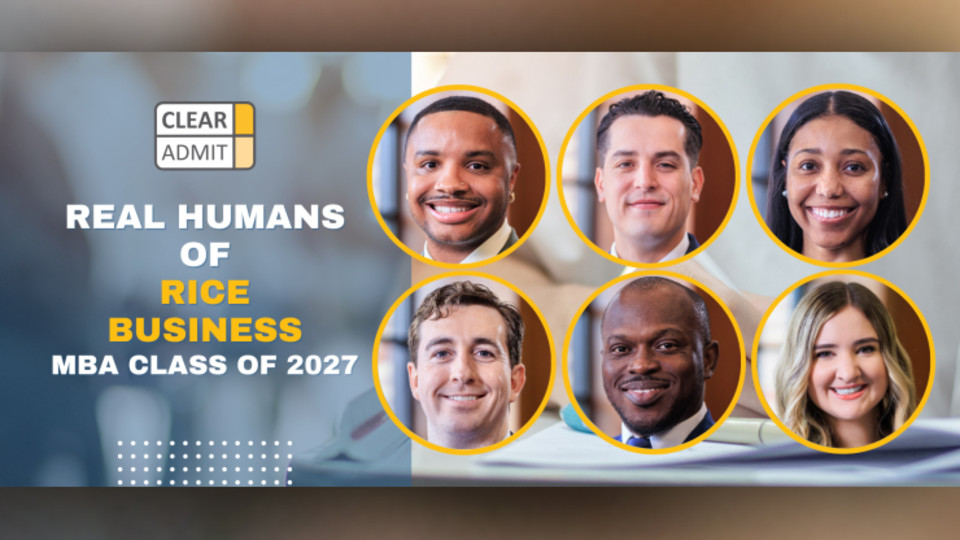
Bhalani, Eldridge to receive Builders Award
Rushi Bhalani ’19 and Will Eldridge ’16 ’17 will be recognized with the Builders Award Nov. 7 during the President’s Town Hall, a signature event of Rice’s Alumni Weekend. The Builders Award is given to graduates of the past 10 years who go above and beyond in service to Rice.
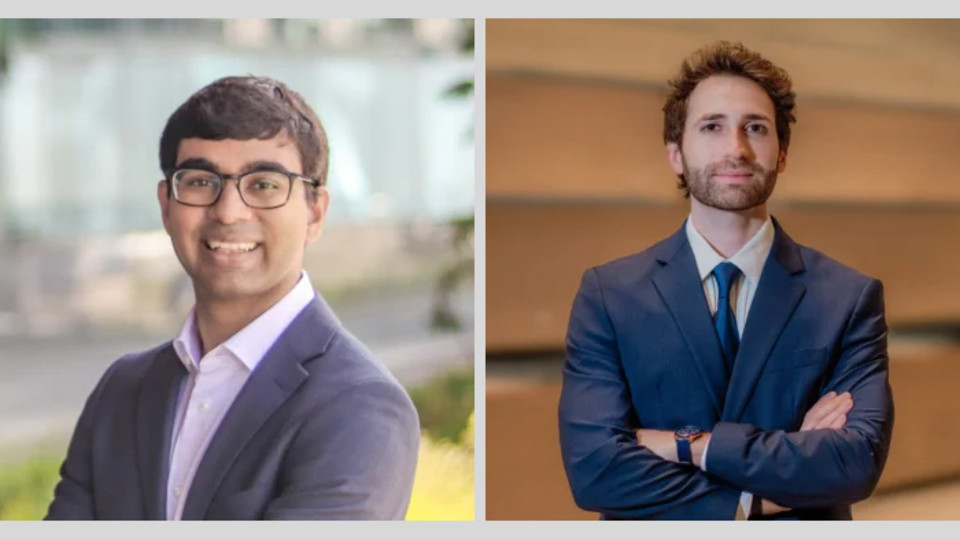
Association of Rice Alumni honors duo for service to university and beyond
Rushi Bhalani ’19 and Will Eldridge ’16 ’17 will be recognized with the Builders Award Nov. 7 during the President’s Town Hall, a signature event of Rice University’s Alumni Weekend. The Builders Award is given to graduates of the past 10 years who go above and beyond in service to Rice.
“Rushi and Will exemplify what it means to be builders — alumni who not only carry the spirit of Rice into the world but actively shape its future,” said David Leal, president of the Association of Rice Alumni (ARA). “Their dedication to strengthening the Rice community and empowering the next generation of Owls is inspiring, and we’re proud to honor them with the Builders Award.”
The award was established by the ARA in 2005 to honor recent alumni who have made outstanding contributions to Rice since graduation.
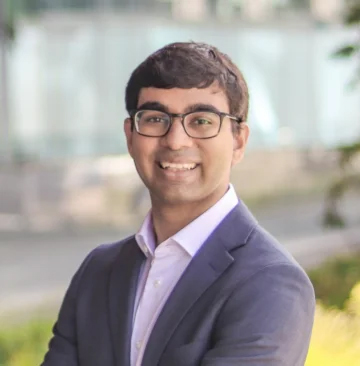
Bhalani graduated with a degree in computer science and has remained deeply engaged with the university community. Guided by a belief in building up others through connection and care, he has served on three alumni boards: the Rice Engineering Alumni board of directors, the ARA board of directors and the Center for Career Development advisory board. In these roles, he has helped lead efforts such as raising more than $200,000 through data-driven outreach, launching a summer internship program that has provided dozens of engineering students with their first professional experiences under alumni mentors and strengthening support for recent graduates.
Beyond board service, Bhalani has volunteered as a Baker College community associate, admissions interviewer, Rice Fund volunteer and mentor to more than 20 students during and after their time at the university.
Professionally, he has worked as a strategy consultant at Accenture and led go-to-market strategy for a billion-dollar platform at Indeed. He is currently pursuing an MBA and a master’s degree in design innovation through the MMM program at Northwestern University’s Kellogg School of Management, preparing to design mission-driven, human-centered product experiences.
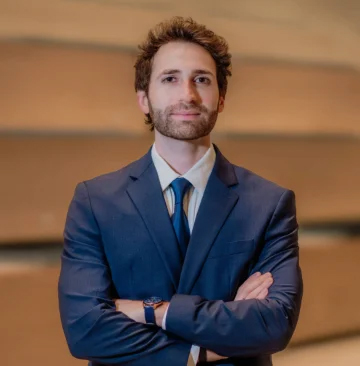
Eldridge is a two-time Rice graduate who earned his bachelor’s degree in civil and environmental engineering from the George R. Brown School of Engineering and Computing and his master’s degree in accounting from the Jones Graduate School of Business.
His passion for contributing to his community through leadership and service started as a core part of the Rice experience. As an undergraduate, he was president of the French Club, an O-Week adviser and a Willy’s Pub bartender. His volunteerism has since expanded as a McMurtry College community associate, externship host, alumni board member, Rice Business mentor, five-year reunion co-chair and alumni admissions interviewer.
As the president of the Rice Business Alumni Association (RBAA) board and a member of Rice Business’ board of advisers, Eldridge is focused on defining the strategic plan for the RBAA. His passion for alumni community building extends beyond the hedges to the Awty International School, where he has also served as alumni board president.
Upon graduating from Rice, he worked at Deloitte, where he served oil and gas clients as a senior auditor. Eldridge earned his MBA from the University of Chicago Booth School of Business and is a consultant at Bain & Co.
For more information about the Builders Award, visit alumni.rice.edu/builders. For more information about Alumni Weekend and the President’s Town Hall, including registration for the events, visit alumniweekend.rice.edu.
You May Also Like

“As a result, Fortune’s methodology doesn’t account for the true price tag of an MBA education. That’s particularly noticeable at generous programs like Rice University’s Jones Graduate School, where 95% of students receive support…with the average annual award being $40,000 per year according to the school.”

The 2026 Rice Business Plan Competition announced today the 42 startups invited to compete for more than $1 million in prizes April 9-11 at Rice University and in the Ion District. The RBPC, presented by Rice Business and hosted by the Rice Alliance for Technology and Entrepreneurship, serves as a global stage for emerging ventures from leading universities.
How Shopping Data Could Reshape the Credit Score System
Everyday retail purchases can help banks identify trustworthy borrowers who lack traditional credit histories, expanding access to credit for millions of unbanked people worldwide.


Based on research by Jung Youn Lee (Rice Business), Eric Anderson (Northwestern) and Joonhyuk Yang (Notre Dame)
Key takeaways:
- An alternative credit score based on retail shopping data helps borrowers lacking a traditional credit history get approved for a credit card.
- Retail-based credit scores can lower default rates if lenders keep approval volumes steady.
- Based on their own customer data, lenders can build tools that generate alternative credit scores from borrowers’ shopping patterns.
More than a billion people worldwide can’t access credit cards or loans because they lack a traditional credit score. Without a formal borrowing history, banks often view them as unreliable and risky.
To reach these borrowers, lenders have begun experimenting with alternative signals of financial reliability, such as consistent utility or mobile phone payments.
New research from Rice Business builds on that approach. Previous work by assistant professor of marketing Jung Youn Lee showed that everyday data like grocery store receipts can help expand access to credit and support upward mobility. Her latest study extends this insight, using broader consumer spending patterns to explore how alternative credit scores could be created for people with no credit history.
Forthcoming in the Journal of Marketing Research, the study finds that when lenders use data from daily purchases — at grocery, pharmacy, and home improvement stores — credit card approval rates rise. The findings give lenders a powerful new tool to connect the unbanked to credit, laying the foundation for long-term financial security and stronger local economies.
Turning Shopping Habits into Credit Data
To test the impact of retail transaction data on credit card approval rates, the researchers partnered with a Peruvian company that owns both retail businesses and a credit card issuer. In Peru, only 22% of people report borrowing money from a formal financial institution or using a mobile money account.
The team combined three sets of data: credit card applications from the company, loyalty card transactions, and individuals’ credit histories from Peru’s financial regulatory authority. The company’s point-of-sale data included the types of items purchased, how customers paid, and whether they bought sale items.
“The key takeaway is that we can create a new kind of credit score for people who lack traditional credit histories, using their retail shopping behavior to expand access to credit,” Lee says.
The final sample included 46,039 credit card applicants who had received a single credit decision, had no delinquent loans, and made at least one purchase between January 2021 and May 2022. Of these, 62% had a credit history and 38% did not.
Using this data, the researchers built an algorithm that generated credit scores based on retail purchases and predicted repayment behavior in the six months following the application. They then simulated credit card approval decisions.
Retail Scores Boost Approvals, Reduce Defaults
The researchers found that using retail purchase data to build credit scores for people without traditional credit histories significantly increased their chances of approval. Certain shopping behaviors — such as seeking out sale items — were linked to greater reliability as borrowers.
For lenders using a fixed credit score threshold, approval rates rose from 15.5% to 47.8%. Lenders basing decisions on a target loan default rate also saw approvals rise, from 15.6% to 31.3%.
“The key takeaway is that we can create a new kind of credit score for people who lack traditional credit histories, using their retail shopping behavior to expand access to credit,” Lee says. “This approach benefits unbanked applicants regardless of a lender’s specific goals — though the size of the benefit may vary.”
Applicants without credit histories who were approved using the retail-based credit score were also more likely to repay their loans, indicating genuine creditworthiness. Among first-time borrowers, the default rate dropped from 4.74% to 3.31% when lenders incorporated retail data into their decisions and kept approval rates constant.
For applicants with existing credit histories, the opposite was true: approval rates fell slightly, from 87.5% to 84.5%, as the new model more effectively screened out high-risk applicants.
Expanding Access, Managing Risk
The study offers clear takeaways for banks and credit card companies. Lenders who want to approve more applications without taking on too much risk can use parts of the researchers’ model to design their own credit scoring tools based on customers’ shopping habits.
Still, Lee says, the process must be transparent. Consumers should know how their spending data might be used and decide for themselves whether the potential benefits outweigh privacy concerns. That means lenders must clearly communicate how data is collected, stored, and protected—and ensure customers can opt in with informed consent.
Banks should also keep a close eye on first-time borrowers to make sure they’re using credit responsibly. “Proactive customer management is crucial,” Lee says. That might mean starting people off with lower credit limits and raising them gradually as they demonstrate good repayment behavior.
This approach can also discourage people from trying to “game the system” by changing their spending patterns temporarily to boost their retail-based credit score. Lenders can design their models to detect that kind of behavior, too.
The Future of Credit
One risk of using retail data is that lenders might unintentionally reject applicants who would have qualified under traditional criteria — say, because of one unusual purchase. Lee says banks can fine-tune their models to minimize those errors.
She also notes that the same approach could eventually be used for other types of loans, such as mortgages or auto loans. Combined with her earlier research showing that grocery purchase data can predict defaults, the findings strengthen the case that shopping behavior can reliably signal creditworthiness.
“If you tend to buy sale items, you’re more likely to be a good borrower. Or if you often buy healthy food, you’re probably more creditworthy,” Lee explains. “This idea can be applied broadly, but models should still be customized for different situations.”
Written by Deborah Lynn Blumberg
Anderson, Lee, and Yang (2025). “Who Benefits from Alternative Data for Credit Scoring? Evidence from Peru,” Journal of Marketing Research.
Never Miss A Story
